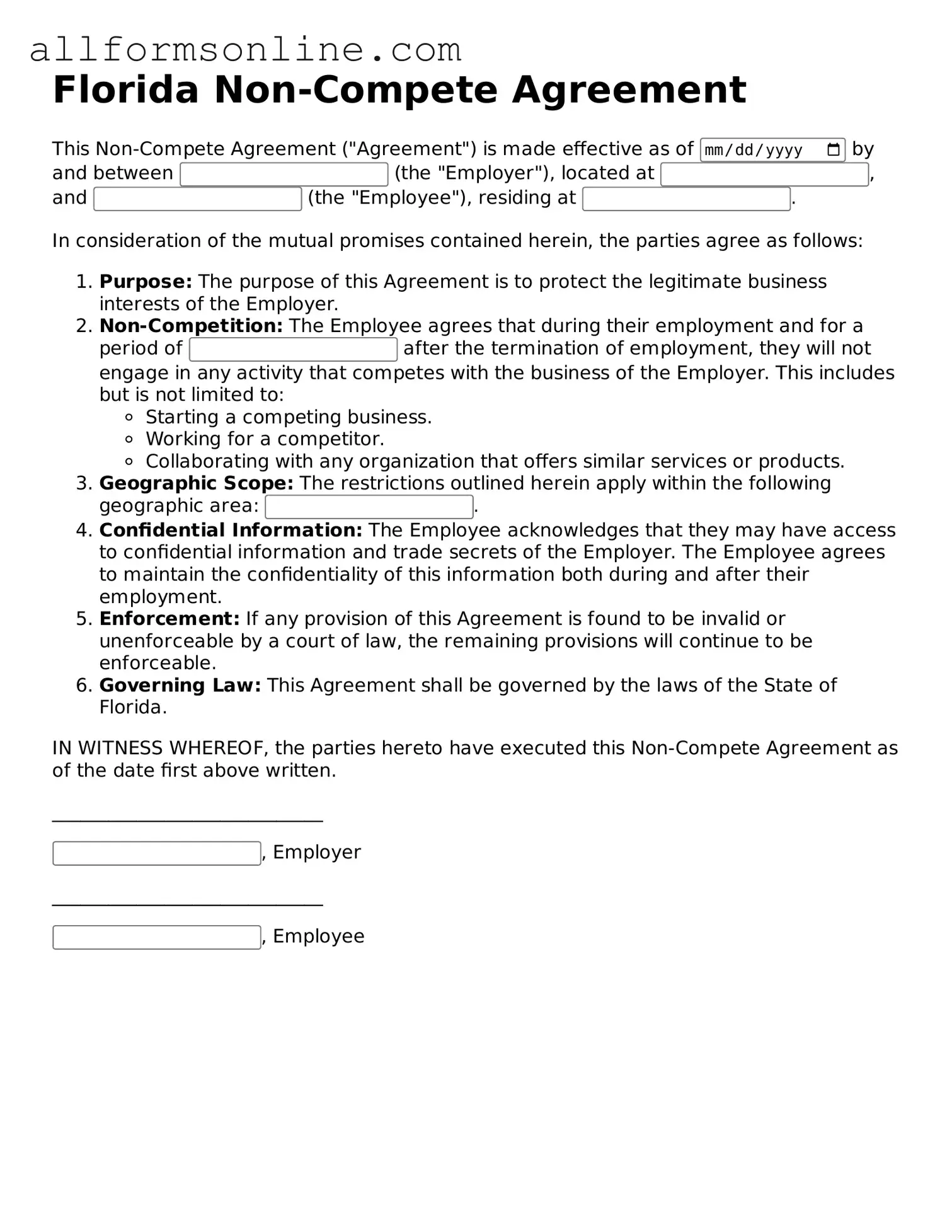Attorney-Approved Non-compete Agreement Form for Florida
Misconceptions
Non-compete agreements are often misunderstood, leading to confusion for both employers and employees. Here are six common misconceptions about the Florida Non-compete Agreement form:
-
Non-compete agreements are always enforceable.
This is not true. In Florida, for a non-compete agreement to be enforceable, it must be reasonable in scope, duration, and geographic area. Courts will often strike down agreements that are overly broad or restrictive.
-
Employees cannot work in their field at all after leaving a job.
This misconception overlooks the fact that non-compete agreements can only restrict specific activities. Employees may still pursue other opportunities that do not directly compete with their former employer's business.
-
All non-compete agreements are the same.
Non-compete agreements can vary widely. Each agreement should be tailored to the specific circumstances of the employment relationship, including the nature of the business and the employee's role.
-
Signing a non-compete means you cannot negotiate.
Many employees believe that once a non-compete is presented, they have no choice but to sign it. In reality, employees can negotiate the terms to better suit their needs and circumstances.
-
Non-compete agreements are only for high-level employees.
While it is common for executives and key employees to have non-compete agreements, any employee can be subject to such agreements, depending on the nature of their work and the company’s interests.
-
Once a non-compete is signed, it lasts forever.
This is a misconception. Non-compete agreements have a specified duration, and once that time period expires, the restrictions no longer apply. The duration should be clearly stated in the agreement.
What to Know About This Form
What is a Florida Non-compete Agreement?
A Florida Non-compete Agreement is a legal contract between an employer and an employee that restricts the employee from engaging in certain competitive activities after leaving the company. This type of agreement is designed to protect the employer's business interests, including trade secrets, client relationships, and proprietary information. In Florida, non-compete agreements must meet specific criteria to be enforceable, such as being reasonable in time, geographic area, and scope of activity.
How long can a non-compete agreement last in Florida?
The duration of a non-compete agreement in Florida varies based on the nature of the business and the specific terms outlined in the contract. Generally, a non-compete can last anywhere from a few months to several years. However, Florida law requires that the duration be reasonable. Courts often consider the industry standards and the interests of both parties when determining if the time frame is appropriate.
What geographic area can a non-compete agreement cover?
The geographic scope of a non-compete agreement must also be reasonable. Florida courts evaluate whether the area is necessary to protect the employer's legitimate business interests. For example, if a business operates in a specific city or region, a non-compete agreement may restrict the employee from working in that same area. However, overly broad geographic restrictions could lead to the agreement being deemed unenforceable.
Can an employee challenge a non-compete agreement in Florida?
Yes, an employee can challenge a non-compete agreement in Florida. If an employee believes that the agreement is overly restrictive or not justified by legitimate business interests, they may seek legal counsel to contest its enforceability. Courts will review the agreement's terms, the circumstances surrounding its signing, and the reasonableness of its restrictions. If found unreasonable, the court may void the agreement or modify its terms to make it enforceable.
Other Common State-specific Non-compete Agreement Forms
Do Non Compete Agreements Hold Up in Court - The right balance in a Non-compete Agreement benefits both the employer and employee.
The California Residential Lease Agreement is a legal document that outlines the terms and conditions under which a property is rented from a landlord to a tenant. This form is essential for clearly defining the rights and responsibilities of both parties in the rental relationship. By using this agreement, both landlords and tenants can ensure a smoother leasing process and avoid potential disputes. For those looking for a comprehensive template, Fast PDF Templates provides an accessible resource.
Non Compete Agreement Pennsylvania - Understanding your rights regarding non-compete agreements is essential.
Nys Non Compete - A non-compete agreement is a contract that restricts an employee from competing with their employer after leaving the company.
How to Use Florida Non-compete Agreement
Filling out the Florida Non-compete Agreement form requires careful attention to detail. Make sure you have all necessary information ready before you start. This will help ensure that the form is completed accurately and efficiently.
- Begin by entering the date at the top of the form.
- Fill in the name of the employee. Ensure the spelling is correct.
- Provide the employee’s address, including city, state, and zip code.
- Next, enter the name of the employer or business entity.
- Include the employer's address, ensuring all details are accurate.
- Specify the duration of the non-compete period. This is typically measured in months or years.
- Clearly define the geographic area where the non-compete will apply. Be specific.
- Outline the nature of the business activities that are restricted under this agreement.
- Both the employee and employer should sign and date the form at the designated areas.
- Make copies of the completed form for both parties for their records.
Once you have filled out the form, review it for any errors or omissions. It is essential that both parties understand the terms before signing. After signing, keep a copy for your records and provide the other party with their copy as well.
